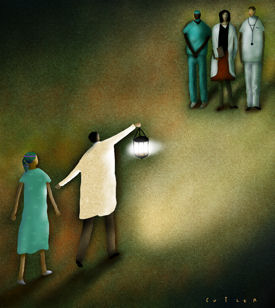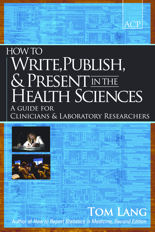Rural experience, global perspective for health care reform
In the midst of an economic recession and escalating health care costs, the College develops directions and solutions for health care reform.
A transformation of the health care delivery system not seen since the enactment of Medicare in 1964 may become a reality at the end of 2009. Call it the “perfect storm,” the “crisis of crises” or whatever worn and hackneyed phrase you want, but the time for health care reform is now.
In the midst of the worst economic recession since the Great Depression, the escalating costs of our health care delivery system, in conjunction with worsening access and marginal performance, are unsustainable. Simply throwing more money at the system in hope of achieving a fix is no longer a tenable option.
As we approach ACP's Leadership Day 2009 on May 19-20, this is no time to bury your head in the sand or stay on the sidelines. Rest assured the ACP, representing 126,000 internist members, is in the game and on the front lines. We must be there to get it right for our patients.
As your President for the coming year, I intend to lead and represent the College with a clear understanding of what it is like in the trenches. My day job continues to be the practice of general internal medicine and geriatrics in a nine-person group practice in Albany, Ga. I continue to experience the rewards and travails of caring for an increasingly aging population, with an ever-growing number of chronic diseases, with an exponentially increasing number of treatment options, in a disjointed and confusing delivery system, and with a distorted and dysfunctional payment system.
While I bring the experience of practicing medicine in rural Georgia to this leadership position, I am keenly aware of how different the environment and situation is for internists across this country, and how different the needs and challenges are for doing what is best for their patients. To that end, I am here to listen and learn. One of the most difficult challenges an organization of our size faces is communication. In addition to transferring information, ACP must engage its members in two-way conversations and empathize with their struggles and concerns. Whatever solutions or ideas we, as a College, bring to the table they must reflect a sense of “We are all in this together.”
All 126,000 of us owe a world of thanks to the staffs of both the Washington and Philadelphia offices for their roles in developing the programs, products and services that have made the ACP the respected medical organization that it is today. We owe a special thanks for the unselfish effort and service of this past year's leaders, Jeffrey Harris, FACP, President; William Applegate, FACP, Chair of the Board of Regents; W. James Stackhouse, MACP, Treasurer; and Donald W. Hatton, FACP, Chair of the Board of Governors. These leaders have clearly epitomized the historical legacy of outstanding leadership throughout the College's history. They have strategically navigated the College into a leadership role in helping to transform health care in this country and create a high-performing delivery system.
Though leadership changes every year, it is reassuring to know that our organization's strength is founded on much more than personalities and individual whims. It is built on a foundation of mission, values and vision that give our policies real firepower. Policy papers on cost and comparative effectiveness, international health care systems, the primary care shortage and the dysfunctional U.S. health care payment system have vaulted the College to a key role in all major discussions regarding health care reform.
Our policies are evidence-based and patient-centered, but facts and ideas alone cannot withstand the “cold winds of politics.” [Hacker JS, Putting Politics First. Health Affairs 27 no.3(2008): 718-723] We need political strategy; grassroots support; strong alliances with outside medical, business and consumer organizations; and a commitment of resources to achieve a health care system with universal access, a strong, effective primary care workforce, and coordinated, highly skilled specialty care.
President Obama made it clear in his State of the Union address that health care reform is one of his major priorities. His proposed $678 billion health care reform reserve fund leaves little doubt of his commitment. As you read this column, House and Senate Committees are busy holding hearings on health reform and drafting major health care legislation that could dramatically affect our lives and those of our patients. All of the branches of our federal government are looking to the ACP for direction and solutions, and I am proud to say that we are “at the table.”
Take a moment to reflect on your mission, values and vision. What will your role be in helping the College achieve success on behalf of internal medicine? I urge you to heed Thomas Friedman's advice, “Think big, start small, act now—before everything becomes too late.” [The New York Times, op-ed, 12/16/2007]




